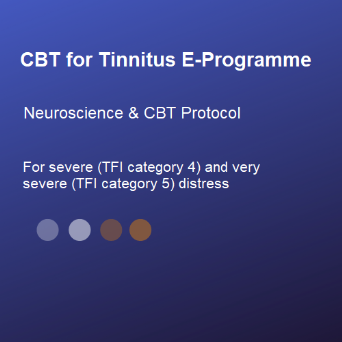Sound Therapy & Prosthetic Management
Hearing Aids:
The use of hearing aids has been accepted as standard in the management of tinnitus since the 1950s in the NHS. Where there is an aidable hearing loss in addition to a troublesome tinnitus, appropriate hearing aids usually have a very positive effect and reduce tinnitus perception significantly.
Sound Therapy
Sound enrichment is widely accepted as being helpful, and certainly many people find the use of recorded nature sounds e.g. sea waves helpful to aid sleep. Listening to music that you like is also helpful, and if you are someone who likes listening to the radio, or even having the TV on in the background, these too are fine.
Worn sound generators are advocated as part of TRT (Tinnitus Retraining Therapy) - the original tinnitus therapy developed by Mr Jonathan Hazell. Most Audiologists prescribe sound generators as a "go to" for help with tinnitus. Be aware though, that using worn sound generators are generally counter-productive when you are using Cognitive Behaviour Therapy (CBT). They are a reason for you to "remember" - and therefore think about - your tinnitus. The objective of using CBT, certainly in the CBT for Tinnitus E-Programme process, is to change habit-thinking and habit-behaviours to where you "forget to remember" to listen to tinnitus. Using worn sound generators - and using "tinnitus apps" (for sounds to use "because you have tinnitus") on your phone - maintain and even strengthen the past-formed reaction-to-tinnitus links in your neural pathways.
More about Sound Therapy
My experience as a clinician is the same as (most) others in the field - hearing aids do have a very significant effect on tinnitus perception, often reducing it to being barely audible during hearing aid use.
Although I have listed hearing aids separately above, they are part of "sound enrichment" of course. However, many who have tinnitus do NOT have a noticeable hearing loss - at least not a hearing loss that can be measured using standard audiometers that measure hearing levels between 250 Hz and 8KHz. There may be some hearing loss at higher frequencies i.e. above 8KHz; indeed recent research was able to demonstrate this:
My experience as a clinician is the same as (most) others in the field - hearing aids do have a very significant effect on tinnitus perception, often reducing it to being barely audible during hearing aid use.
Although I have listed hearing aids separately above, they are part of "sound enrichment" of course. However, many who have tinnitus do NOT have a noticeable hearing loss - at least not a hearing loss that can be measured using standard audiometers that measure hearing levels between 250 Hz and 8KHz. There may be some hearing loss at higher frequencies i.e. above 8KHz; indeed recent research was able to demonstrate this:
Sereda, M., Hall, D.A., Bosnyak, D.J., Edmonson-Jones, M., Roberts, L.E., Adjamanian, P., Palmer, A.R. (2011) Re-examining the relationship between audiometric profile and tinnitus match, International Journal of Audiology 50 (5): 303-12)
It is still, however, the case that even if hearing loss is identified in the upper range of frequencies, most hearing aid specifications do not amplify beyond 9KHz maximum; indeed most reach well below those frequencies.
